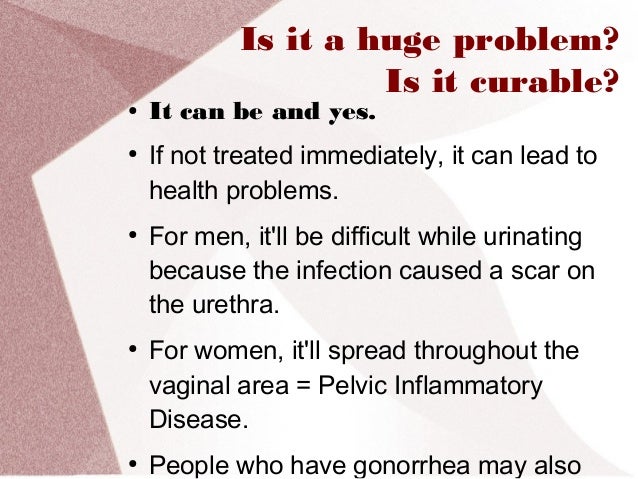
Image source: https://image.slidesharecdn.com/bio104-131205162459-phpapp01/95/neisseria-gonorrhoeae-gonorrhea-11-638.jpg?cb=1386260765
One of the most unpleasant parts of a manhood infection is having to tell former and current partners about the condition. These individuals deserve to know about what is going on so they can get themselves tested and take other steps to protect their own health. But for the person who has to tell them, breaking the news is definitely not an easy matter.
Here are some tips to help the man who must tell a former or current partner about socially shared diseases that he might have shared with them.
1) Be absolutely sure. Dont tell them just on a hunch that a disease might be present. Have the tests, then have the results in hand when making that call.
2) Call or tell them in person. Though it might be tempting to send an email, its always best to tell them in person, if possible, so they can ask questions immediately. If in-person wont work, call them. And if that wont work, try texting them with a request to talk - now.
3) Dont lay blame. Odds are that if a man has a socially shared disease, hes not entirely sure where it came from. If there was only one partner, then obviously it could be clear - but even so, never lay blame on another person when calling to tell them the news. The idea is to get them concerned for their health and get them to get tested, not to make them feel defensive or ashamed.
4) Get the word out fast. Not only do they need to know, they need to know yesterday - so make sure to get the word to them as soon as possible. This can help them get the care they need much sooner, and can prevent them from passing it on to someone else if it turns out they do have the socially shared disease.
5) Come prepared with answers. There will be many questions, of course, and most of them need to be answered by their doctor. But a man might be able to provide some insight to the partner when he mentions the disease. For instance, a guy who has been diagnosed with gonorrhea can reassure their partner that it can be cured, as long as they get to the doctor quickly and take the medication as directed.
6) Be ready for emotion. The very idea of a socially shared disease can make someone feel anxious, depressed, angry, horrified, ashamed, defensive and many other emotions - sometimes all at once! And when that emotion hits, they are likely to vent on the most convenient target, which happens to be the guy who just called them with the bad news. So be prepared to listen to what they have to say yet stay calm and cool, even when dealing with that tidal wave of emotion.
Finally, a man should take every step possible to make sure he never has to make that kind of phone call or visit again. He can do this by practicing even better male organ care than he has in the past, including always wrapping up the member when its time to get busy.
And of course, daily care matters as well. He can help ensure a strong, healthy male organ with a good member health crme (health professionals recommend Man 1 Man Oil, which is clinically proven mild and safe for skin). This crme should contain a plethora of protective ingredients, such as L-arginine for better blood flow and oxygenation, alpha lipoic acid to fight free radicals and vitamin A to eradicate bacteria.
Visit www.menshealthfirst.com for more information about treating common male organ health problems, including soreness, redness and loss of male organ sensation. John Dugan is a professional writer who specializes in men's health issues and is an ongoing contributing writer to numerous online web sites.
